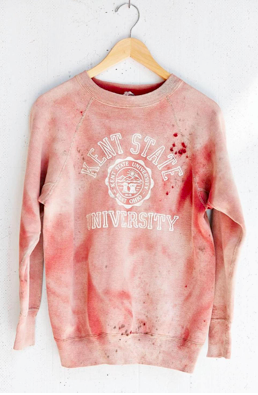Brands clothed in controversy

Brandy Melville and Urban Outfitters, stores acclaimed for their hipster inventory, have been producing highly controversial items with controversial production methods, which is costing them customers and gaining critics.
“Both of these stores are completely exploiting personal problems and trying to make them into something that is trendy and grunge,” Brittany Hood ’16 said in response to the “Stressed, Depressed, but Well Dressed” shirt from Brandy Melville and the “Eat Less” shirt from Urban Outfitters.
Urban Outfitters has also been producing drug and alcohol related clothing, such as socks with marijuana leaves.
However, the tipping point was the Kent State “Vintage” sweatshirt that featured red blood-like stains around tears that strongly resembled bullet holes, a reference to the deadly shooting at the college in 1970.
The recent school shootings around the country have made everyone more sensitive to the unfortunate reality that shootings can occur anywhere.
“You just can’t make clothes representative of school shootings, especially when we’re all very sensitive,” Jenna Patterson ’16 said. “That’s beyond hipster.”
Along with the shirts, students like Natalie Chun ’17 are protesting the clothing stores and similar corporations for child labor and human trafficking. Chun explained that this is particularly difficult in Westport because so many of the stores partake in these practices.
“Glaring [controversial stores] I try to avoid, but stores in town like Gap and Old Navy make it hard to avoid,” Chun said. “It’s usually a matter of convenience.”
Angry activists across the country believe these companies and their products are immoral.
“They don’t care what kind of attention they get, whether it’s positive or negative,” Hood said. Instead, she suggests, “Don’t shop there, don’t encourage other people to shop there and don’t support the company.”
Many of the items that can be purchased at these stores also glorify serious conditions, such as eating disorders, alcohol abuse, drug abuse and violence. With over 24,000,000 people suffering from eating disorders in America, according to the National Institute of Anorexia Nervosa and Associated Disorders, and 24.6 percent of the population abusing alcohol, according to the National Institute of Alcohol Abuse and Alcoholism, some may claim that these shirts hit too close to home.
Hood argues that with so many people affected, it’s “inappropriate and indecent to be publicizing and making something casual” about these pertinent struggles.
Middle-school-aged children [who are frequent Brandy Melville customers] may not understand yet of the severity of these problems.
“I feel like it’s difficult to blame a kid who buys a shirt because they see all their friends are wearing it,” Patterson said.
Brandy Melville is also home to a “one-size-fits-most” policy, in which all of the clothing in the store is produced in only one size. The clothing is expected to fit girls of varying size.
Patterson recognizes the corruption in this. When Brandy Melville first arrived in Westport, she boycotted the store and their sizing policy. However, convenience of the location and the prices eventually brought her to the dressing room.
“When you try something on that’s meant for the smaller girls, and you don’t consider yourself a smaller girl, and it fits, it feels really good,” Patterson said. “It’s a reverse self esteem thing.”
For the future, Hood hopes that people will think about the repercussions of wearing these items and what message they are sending in doing so.
“[The brands are] not stylish or fashionable. [They are] a disease and illness,” Hood said.

Deanna Hartog ’16 is ready to bring her enthusiasm and energy from the stage to the newsroom.
Hartog, one of the Sports Editors, has been acting since...





















































